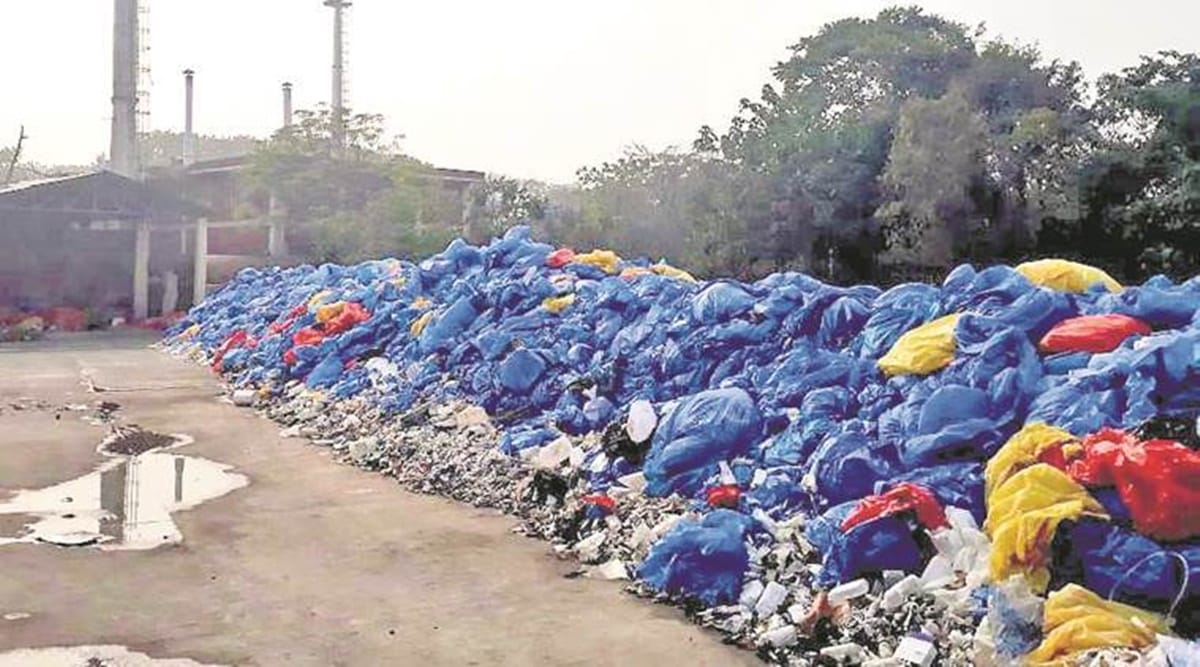 While in 2019, on an average, 62.4 tonnes of biomedical waste was being generated per day, this has increased to 90.6 tonnes per day.(Representational)
While in 2019, on an average, 62.4 tonnes of biomedical waste was being generated per day, this has increased to 90.6 tonnes per day.(Representational) THE SPIKE in Covid-19 cases has also led to a rise in the medical waste generated, which includes municipal solid waste (MSW) and biomedical waste (BMW) from Covid care centres and home quarantine. Data from the BMC shows that in the first week of April, the city has already generated a daily average of 50,000 kg Covid waste; in March, this average was 39,000 kg daily.
According to data, there are 279 institutional quarantine and 5,920 residential quarantine areas from where civic staff as well as a private firm, operating a biomedical plant in Deonar, collects Covid waste. Since April 2, the total amount of BMW and MSW has crossed 50,000 kg. After the second wave hit the city, the BMC started operating many Covid care centres that were shut following a dip in cases. At present, there are 25,455 beds operational for Covid-19 treatment. Just a month ago, the total was around 12,000.
Apart from this, the number of sealed buildings have also increased since maximum cases are found in housing societies. There are more than 900 sealed buildings in Mumbai.
The data shows that from April 1 to 6, the average daily BMW generation from Covid centres was 1,265 kg, which was collected in yellow bags, and MSW was 49,296 kg, collected in black bags.
Biomedical waste includes syringes, medicines, used masks, gloves, urine bags, body fluid or blood-soaked tissues or cotton, PPE used by staff on Covid duty. All of this Covid waste is being collected in yellow bags with biohazard signs on them. Other municipal solid waste like food, disposable plates generated from quarantine centres are collected in black bags.
“From home quarantine areas, our people collect Covid-19 waste, and separately transport it to Deonar dumping ground. Also, from Covid care centres, the civic team from solid waste management collects the waste and hands it over to SMS Envoclean Private Limited,” said Sunil Sardar, deputy chief engineer, solid waste management.
Although the quantity of Covid-19 waste has increased, civic officials claimed that the situation was under control since they now had better planning and new guidelines from Central Pollution Control Board (CPCB). “Initially,, all the Covid-19 related waste used to be sent in biomedical waste disposal plants based in Deonar as there were no clear protocols. But now many things at Covid centres that are used by patients like disposable plates, cultlery are disposed of in other ways that reduces the pressure on incineration,” said Amit Nilawar from SMS Envoclean Private Limited. The Deonar plant of for biomedical waste disposal has a capacity of 25 metric tonnes daily.
Last year, a study by Maharashtra Pollution Control Board (MPCB) on ‘Impact evaluation of Covid-19 pandemic on environmental attributes’ showed that biomedical waste generation of the state increased by 45 per cent. While in 2019, on an average, 62.4 tonnes of biomedical waste was being generated per day, this has increased to 90.6 tonnes per day.
- The Indian Express website has been rated GREEN for its credibility and trustworthiness by Newsguard, a global service that rates news sources for their journalistic standards.

